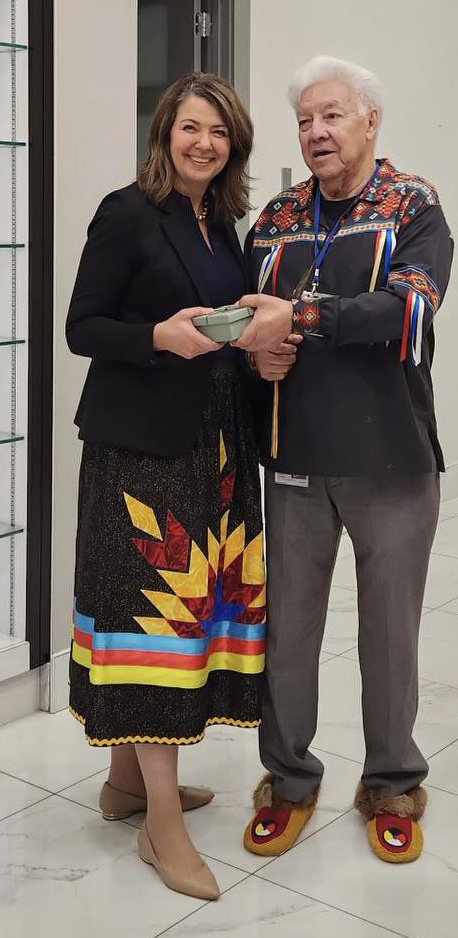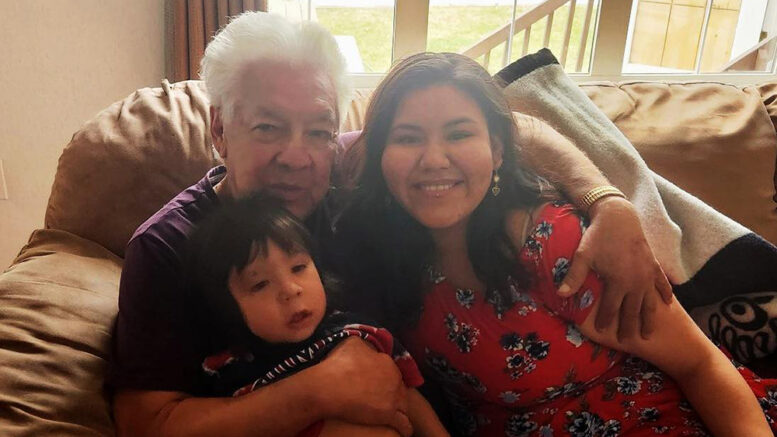by Kinnukana, Local Journalism Initiative Reporter
(ANNews) – The road to Indigenous eldership takes time as it is sacred work. Elder Gilman Cardinal began his path to becoming an Elder at an early age and his life experiences have contributed to the wonderful work that he does now. As an Elder, he shares and educates others about his culture and history in order to create positive change.

Elder Gilman Cardinal receiving protocol from Alberta Premier Danielle Smith. Photo supplied.
Elder Gilman Cardinal grew up in his home community of Calling Lake, Alberta. He was raised by his Métis mother and Bigstone Cree father and his grandparents. He was brought up in the era of residential schools. He recalls at nine years old when a plane landed to pick up First Nations children. Most kids in the community were taken from Calling Lake and sent to residential school. Gilman asked his grandfather why this was happening, and his grandfather told him it was the law. Families were ordered to bring children to the dock to go on the plane or they could be jailed. Fortunately, Gilman’s mother chose not to register as a First Nations member when she married his dad. All First Nations mothers had to register their child/ren at birth in the hospital and the names were sent to the Indian registry in Ottawa. The list was also used to identify children for residential schools. Gilman’s mother was able to protect her children so that they could stay at home. Elder Gilman Cardinal said, “Women were fire keepers and kept family together, they kept culture and language together and protected our teachings.”
After seeing the children leave, Gilman made a vow to himself that he would work the rest of his life to help make change, but it was not easy for him either. When he went to school in the community the students were told not to talk Cree, or they would get punished. Gilman learned about his culture by helping Elders with ceremonies. The Elders in the community had to hide their teachings and ceremonies so it was not something he talked about with others. Gilman also experienced racism and discrimination at age nine when he went on a trip to Athabasca with his grandfather. While there, Gilman saw writing on the doors of businesses that said, ‘No dogs or Indians Allowed.’ This made Gilman upset and to this day he still struggles going to Athabasca.
Gilman’s mother prepared him to one day leave the community of Calling Lake and she told him to get a government job. When Gilman was old enough, he moved to Slave Lake and kept his promise to his mother. He got a job with the government and put together a Job Core program that focused on supporting people to get off of social assistance. Gilman and his staff worked with families in the community and expanded the work to include opportunities for apprenticeship, trades training, and career counselling. Gilman wanted to become part of the solution instead of being part of the problem.
Gilman worked for twenty years in Slave Lake before continuing his government career in Edmonton, Alberta for another twenty years. When he moved, he was gifted the key to the Town of Slave Lake for all his excellent work and he also won a Premier’s Award of Excellence for his successful Job Core program.
Gilman says he was and still is a workaholic, but he had to slow down at fifty years of age when he had a heart attack. His healing took him to an Elder in Maskwacis where he stayed all summer and went through a right of passage and many different healing ceremonies. The Maskwacis Elder knew his full history and all the things he accomplished. After the last ceremony, the Elder gave him protocol in the form of tobacco and asked Gilman to accept it. Gilman asked him what it was for, and the Elder said I want you to start following the path of Eldership. Gilman was blown away. He thought of it in the past, but it is such a respectful position and humbling place that he thought he did not qualify for it. The Elder explained to him that all of Gilman’s life had been focused on teaching his language, culture and empowering young people in education, training, employment, and homelessness that he absolutely earned the right to be an Elder. Elder Gilman Cardinal accepted it and also earned a spirit name which he said is sacred and he only uses it for special occasions.
Elder Gilman Cardinal said the role into Eldership took on many challenges when he first started. Being an Elder in an urban setting is different than in the community. He spends lots of time teaching the outside world about his culture and history. He said, “If you want to make an impact and have success with Indigenous communities and lessen the high rates of unemployment and incarceration, you have to work with us at our level. This is what I have been teaching – come to our community, sit with us, we will smudge you and cleanse the place where you are going to work and then bring your agenda forward. If you do not do it that way you can leave the door you came in and walk out the same way.”
Elder Gilman Cardinal has fifteen grandchildren, ten biological and five from extended family members. He loves to pass his knowledge to them. He also works part-time at Telus World of Science and loves being able to enhance their programming. He does work for individual companies, government ministries and organizations that reach out to him to provide ceremonies and training. Recently, he received one of the first ever Okimaw Awards that recognized his contributions as a Courageous Warrior and Okimaw (leader). When others ask him if the world for Indigenous people is changing and how can they help, he replies with ‘Come and walk with us, beside us, get to know us. We are moving forward.’



Be the first to comment on "Elder Gilman Cardinal’s path to eldership leads to positive change for Indigenous people"